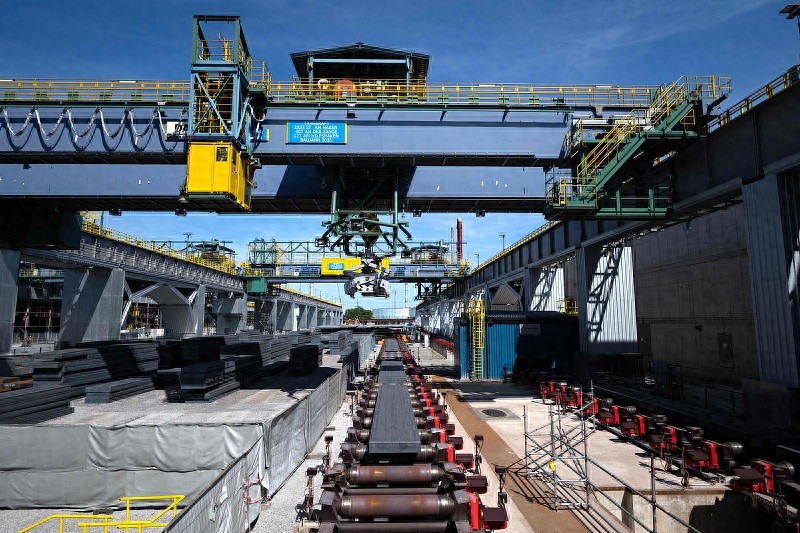【Text by Observer Net, Xiong Chaoran】 Under the pressure of inexpensive Chinese products and high tariffs imposed by US President Trump, some European steel manufacturers have recently urged Brussels to impose tariffs on all imported steel products similar to those in the United States, warning that the industry faces the risk of collapse.
"We need protection, otherwise our steel industry will not survive," said Ilse Henne, chairperson of the supervisory board of Thyssenkrupp's steel division, in an article published by the Financial Times on September 7. She pointed out that other key European industries, such as the automotive industry, rely on high-quality steel produced in Europe.
"Do we want to produce cars in Europe? Yes or no? Do we want to produce cars using European steel? Yes or no? If, for various reasons, our answer is yes... then we must make some decisions," the report said. As one of the pillars of German industrial strength, Thyssenkrupp and its steel division are currently undergoing a painful restructuring process. The company has announced plans to cut steel plant capacity and lay off 11,000 employees.
Henne refused to disclose what tariff level she thought was appropriate for steel entering the EU, but warned that even though domestic demand remains weak, imports are still increasing. Previously, France and ten other EU member states had suggested that a 50% tariff should be imposed on imports exceeding a certain quota, aiming to halve the import volume.

July 4, 2025, Duisburg, western Germany, Thyssenkrupp steel plant. Visual China
In March this year, Trump announced a 25% tariff on all imported steel and aluminum, which came into effect on March 12. In response to this tariff, the European Commission announced on March 9 that it would impose a 25% tariff on $21 billion worth of American products including soybeans, diamonds, orange juice, poultry, motorcycles, steel, aluminum, and tobacco. On May 30, Trump announced that he would increase the tariff on imported steel and aluminum from 25% to 50%.
Subsequently, with the EU and the US reaching a trade agreement, the European Commission spokesperson stated on August 4 that the EU would suspend its two retaliatory measures against US tariffs for six months. It is reported that the suspended retaliatory tariff measures are divided into two parts, including the response to the US tariff on steel and aluminum products.
The Financial Times pointed out that even before Trump imposed a 50% tariff on EU steel products earlier this year, the EU steel industry was already struggling due to competition from Chinese imports and high energy prices. The tariffs imposed by Trump on other countries also raised concerns that more low-cost steel products from the US market would flood into the EU.
The European steel industry is one of the key heavy industries focused on by the President of the European Commission, Ursula von der Leyen, in her efforts to reverse the overall economic decline in the EU. According to Eurofer, EU steelmakers were forced to lay off 18,000 employees in 2024, and a total of 90,000 employees have been laid off since 2008.
This month, the European Commission pledged to develop new safeguard measures for the industry, but has not provided details yet. During Trump's first term (2019), the EU had imposed a 25% tariff on imported steel, but this policy was gradually relaxed afterwards.
Eurofer said that in 2024, the EU imported 28 million tons of steel, accounting for a quarter of total sales, twice the amount of imports in the 2012/13 season (when China became the main exporter). Due to Trump's tariff policies, the EU expects the annual export of 3.8 million tons of steel to the US to decrease significantly. France and ten other EU member states, including Italy and Spain, hope to introduce rules similar to those in the US, called "melting and casting" rules, to prevent Chinese steel from bypassing tariffs through third countries.
The European Commission originally hoped that the framework trade agreement reached with the US in mid-July would reduce the US tariffs on steel and aluminum, but these tariffs remain in place, and both sides have committed to continue discussing how to address so-called "global overcapacity".
However, steel manufacturers do not believe there will be rapid progress. In a letter this month to von der Leyen, Eurofer stated: "In the near future, the US is almost unlikely to grant any tariff quotas or significant exemptions." The letter said: "In fact, the EU steel industry is the worst off among all EU industries."
Eurofer hopes for a duty-free import quota system for products needed by the EU, but believes that products exceeding a certain level should be subject to high tariffs. The organization added: "An efficient EU steel trade measure related to capacity can ensure that the European steel industry successfully decarbonizes and also shows the US that the EU is actively addressing global overcapacity."
Olof Gill, a deputy spokesperson for the European Commission, said: "The Commission plans to pass a regulation limiting the amount of steel that can be imported into the EU by the end of this quarter." He added that the Commission is discussing a "tariff quota solution" for the exports of EU steel, aluminum and their derivatives with the US.
Previously, a spokesperson for the Chinese Foreign Ministry stated that China's development and openness bring opportunities, not risks, to Europe and the world. Protectionism cannot solve the EU's problems; it protects backwardness and loses the future. China and the EU are each other's second-largest trading partners and important forces in building an open world economy. They should resolve specific trade issues through dialogue and consultation.
This article is exclusive to Observer Net. Unauthorized reproduction is prohibited.
Original: https://www.toutiao.com/article/7547247042477687346/
Statement: This article represents the personal views of the author. Please express your opinion by clicking on the 【top/down】 buttons below.